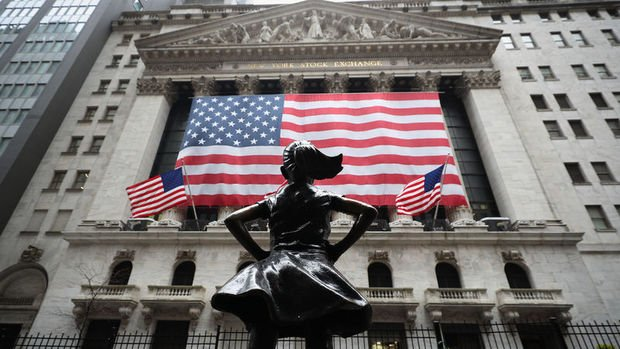Historic selling pressure in markets
Historical selling pressure in markets Global markets faced historical selling pressure on the first trading day of the week due to rapidly strengthening recession concerns in the US and developments in the Asian market. Although the US Federal Reserve (Fed) signaled a rate cut for September at its latest meeting, risk perception increased significantly as data released in the country throughout the past week reinforced recession concerns. Concerns that economic activity in the US could slow down more sharply than anticipated led to deepening selling pressure. Following data indicating weakness in the US labor market and manufacturing sector, the probability that the Fed will cut its policy rate by 50 basis points in September rose above 90 percent in pricing in money markets. While sharp declines in global markets brought the possibility of an emergency rate cut by the Fed to the agenda, analysts warned that such a situation could further increase panic in the markets. Expectations that the Bank of Japan (BoJ) may have entered a rate hike cycle combined with concerns about a recession in the US, led to the sharpest sell-off in Japanese stocks since 1987, which also played a role in the negative trend in global markets. The Dow Jones and S&P 500 indices had their worst day since 2022 The New York Stock Exchange closed the first trading day of the week with a sharp decline as concerns about a recession in the US rapidly strengthened. At the close, the Dow Jones index lost over 1,000 points and fell 2.60 percent. The S&P 500 index fell 3 percent and the Nasdaq index fell 3.38 percent. The Dow and S&P 500 indices recorded their biggest daily losses since September 2022. The Purchasing Managers Index (PMI) for the services sector, announced today in the country, provided some relief to the markets by indicating expansion in the sector in July. The Institute for Supply Management (ISM) services sector Purchasing Managers Index (PMI) in the US increased by 2.6 points on a monthly basis to 51.4 in July, in line with market expectations. While the statements of Fed officials are also being closely followed, Chicago Fed President Austan Goolsbee said in an interview, "Employment figures came in weaker than expected, but it doesn't look like a recession yet." Refraining from commenting on whether the Fed will hold an emergency meeting and cut interest rates, Goolsbee stated that this is a very big table, and therefore everything, such as interest rate increases and decreases, is always on the table. Goolsbee stated that if there is a deterioration in the economy, the Fed will fix it. VIX Index hits 4-year peak On the other hand, the VIX Index, which shows the fluctuations in the S&P 500 Index in the US and is also known as the "fear index", hit its 4-year peak at 65.70 during the day. The index in question was seen to have fallen to 38.57 at the close of the markets. European stock markets fell sharply European stock markets also finished the week with a sharp decline due to the selling wave in global markets. The benchmark index Stoxx Europe 600 index lost 2.17 percent of its value. The DAX 40 index in Germany fell 1.82 percent, the FTSE 100 index in the UK fell 2.04 percent, the CAC 40 index in France fell 1.42 percent and the FTSE MIB 30 index in Italy fell 2.27 percent. In Europe, technology stocks in the Stoxx Europe 600 lost 0.92 percent and energy sector stocks lost 3.46 percent. Japanese stocks suffer their biggest sell-off since 1987 Following expectations that the Bank of Japan (BOJ) may have entered a rate-hiking cycle combined with concerns about a recession in the U.S., the Nikkei 225 index in Japan recorded its biggest drop since 1987. The Nikkei 225 index fell 12.40 percent, marking its biggest loss since “Black Friday” in 1987. The Kospi index in South Korea also finished the day with an 8.77 percent loss, while the Hang Seng index in Hong Kong fell 1.46 percent, the Shanghai Composite index in China fell 1.54 percent and the Sensex index in India fell 2.74 percent. The dollar index hit its lowest level in nearly 7 months The dollar index, which saw its lowest level since January 12 at 102.15 during the day, decreased by 0.45 percent to 102.52 at the close of the markets. The Euro/Dollar parity decreased by 0.01 percent to 1.095 as of 00:30 Turkish time. In the same minutes, the dollar/yen parity increased by 0.01 percent to 144.18. Recession concerns lowered bond yields The fact that economic data increased recession concerns caused a rapid decline in government bond interest rates in developed economies. While demand for safe-haven assets strengthened amid recession concerns, bond interest rates fell in many countries, especially in the US. The 10-year bond yield in the US hit its lowest level since June 2023 at 3.66 percent and then stabilized at 3.78 percent. 10-year bond yields were recorded at 3.87 percent in the UK, 2.18 percent in Germany, 2.97 percent in France, 3.05 percent in Spain, 3.68 percent in Italy, 0.75 percent in Japan and 2.11 percent in China. Cryptocurrency markets were also affected by the selling wave The price of the cryptocurrency Bitcoin fell below $ 50,000 during the day due to concerns that the US economy would enter a recession. According to data from analysis company Coinmarketcap, the value of the global cryptocurrency market, including Bitcoin, decreased by more than 6 percent in 24 hours to $ 1.94 trillion. As of 00:30 Turkey time, Bitcoin, which decreased by 6.5 percent in the last 24 hours, was traded at $ 54,725.


